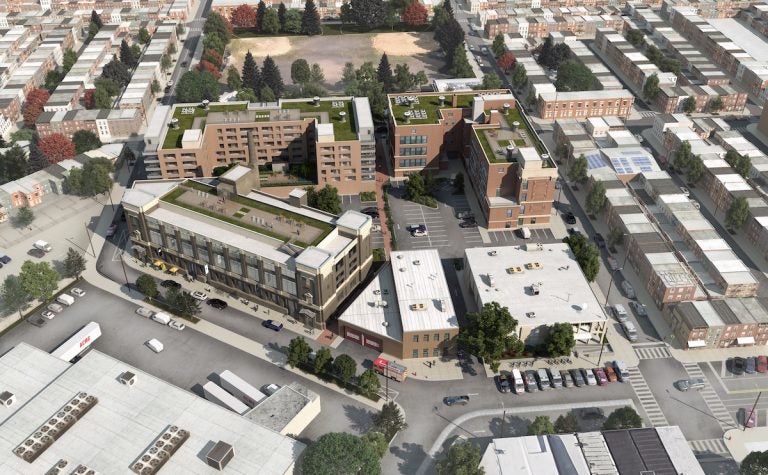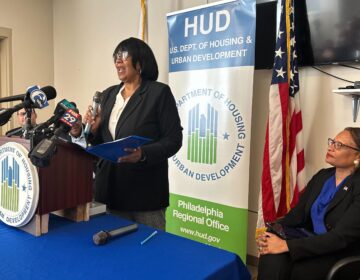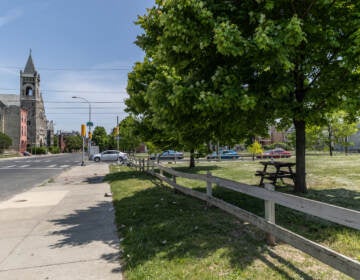Philly neighborhoods are fighting over development. A new tool may help
The free online tool grapples with the question that looms over many development-related clashes: How to grow a neighborhood without disrupting its fabric.

Alterra's rendering shows a birds-eye view of the mixed-use development planned for land now occupied by city buildings. (Courtesy Alterra Property Group)
Recent controversies in Squirrel Hill, Society Hill, Point Breeze, and just about every other neighborhood in Philadelphia have prompted new debates around land use, equity, and fears of displacement.
The specter of gentrification looms large in the imagination of the average Philadelphian and studies suggest Black and Latinx renters are disproportionately impacted by the city’s rising property values. While the city has recently completed a robust comprehensive and district-level planning process, Philly2035, smaller-scale development, neighborhood change, and new land-use policies require ongoing, real-time capacity to engage communities around emerging development issues.
In 2021, Urban Spatial LLC, with funding from the Knight Foundation and Spruce Hill Trust, is launching “OurPlan,” a free, open-source, web-based technology that uses videos and surveys to teach and engage communities around their neighborhood’s land use issues. OurPlan combines community engagement and technology to help neighborhoods plan for equity and preservation — two outcomes that are hard to square, particularly in gentrifying neighborhoods. It attempts to grapple with urban planning’s most wicked problem: How can we grow a place without disrupting the fabric that makes that place special?
On the one hand, Philadelphia has a long history of disinvestment and property devaluation, particularly for older neighborhoods surrounding Center City. After extensive population and tax revenue decreases in the last half of the 20th century, Philadelphia has experienced sustained population growth since 2000. It reversed its “brain drain” pattern of losing college graduates trained in the area’s many higher education institutions and invested resources into new policies and tax instruments to stimulate high-end residential and commercial growth.
On the other hand, incumbent residents of developing neighborhoods may feel disenfranchised, wondering if new development, new people, and amenities means that their community is no longer for them. They often lack the political capital to quell real estate speculation and advocate for the preservation of their communities to uphold the cultural, demographic, economic, or architectural values unique to the neighborhood.
These preservation values range from affordability and proximity to green spaces to architectural styles and cultural history. To protect these values, some residents resort to NIMBY-ism (Not-In-My-Backyard), rejecting any new community development. Unfortunately, the complexity around the city’s land use and zoning processes means there are few standardized, public venues that can accommodate these debates in a timely and equitable fashion.
NIMBY-ism, however, may ultimately come at the cost of their home. More demand for housing without new housing supply can increase housing costs. In response, some urbanists (YIMBYs or Yes-In-My-Backyard) support a development-over-preservation strategy, arguing that new housing supply is needed to ensure greater equity — that everyone, regardless of race and class, can access and afford neighborhoods of opportunity in the city.
OurPlan is a framework that brings both groups together to understand tradeoffs in equity and preservation in the context of neighborhood development. OurPlan uses virtual and in-person community engagement strategies to foster a dialogue between different interest groups, as well as novel, open source technology, using Philadelphia’s own open data site, to provide insights on development and preservation opportunities. The goal is to assist residents in learning about urban development and preservation through engaging and accessible videos, and in establishing core community values through a survey that captures community preferences for preservation or development for a sample of neighborhood properties.
The outcome of this engagement — which can happen across virtual and real domains, in real-time, or an ongoing basis — is a land use map that displays for each parcel its “preservation suitability” calculated from the survey and its “development suitability” based on several measures of real estate development. When both measures are combined in a mobile mapping application, designed in partnership between Urban Spatial, Jarvus, and Kent Russell, residents can see for each property the utility of both preservation and development. They can also visualize zoning, home price, permits, and other housing indicators on the map and over time. The goal of OurPlan is to create less “friction” and more transparency between stakeholders around land use and development in the city through a real-time aggregate reflection of how the community feels about each parcel.
In 2019, we piloted the effort in Philadelphia’s Spruce Hill neighborhood, and now we are developing a version that would allow anyone in any Philadelphia neighborhood to stand up a plan on their own.
Our goal is for this technology to carry over into in-person community engagement meetings to create an accord between the preservationists and those who see new development as a means toward equity. The answer is not all of one and none of the other, but preservation and development in doses — a deliberate planning process that can help local Registered Community Organizations (RCOs) and their constituents balance growth and equity.
The team is excited about the effort and look forward to debuting the framework in the mid-to-late summer in the Spruce Hill and Fairhill neighborhoods, with the goal of OurPlan becoming available to any Philadelphia neighborhood that wishes to plan for its future.
—
Ken Steif, Ph.D is the founder of Urban Spatial and a 20+ year resident of West Philly. He is the Program Director of the Master of Urban Spatial Analytics program and a Professor of Practice in City Planning, both at the University of Pennsylvania. Follow him on Twitter @KenSteif.
Akira Drake Rodriguez is an Assistant Professor of City Planning at the University of Pennsylvania.
Sydney Goldstein works as a City Planner/Data Scientist at Urban Spatial where she creates analytical and strategic planning tools to advance community development.
 WHYY is one of over 20 news organizations producing Broke in Philly, a collaborative reporting project on solutions to poverty and the city’s push towards economic justice. Follow us at @BrokeInPhilly.
WHYY is one of over 20 news organizations producing Broke in Philly, a collaborative reporting project on solutions to poverty and the city’s push towards economic justice. Follow us at @BrokeInPhilly.

Subscribe to PlanPhilly
WHYY is your source for fact-based, in-depth journalism and information. As a nonprofit organization, we rely on financial support from readers like you. Please give today.





